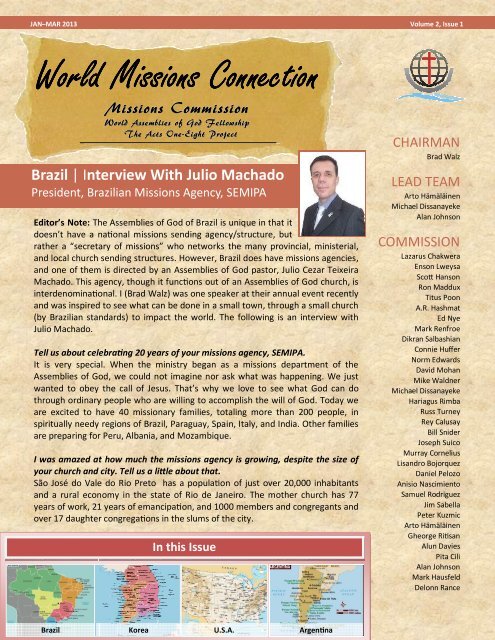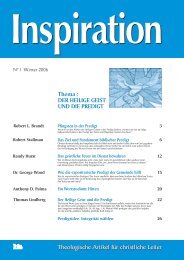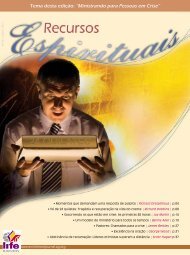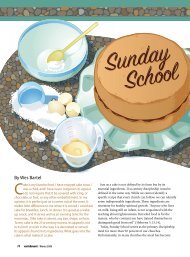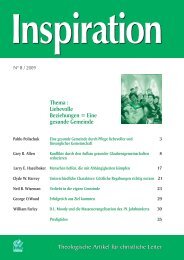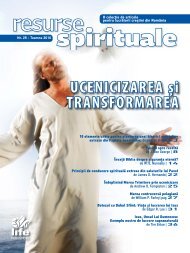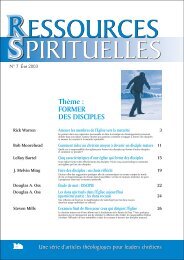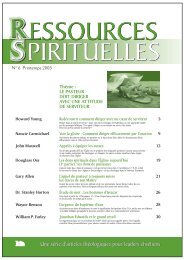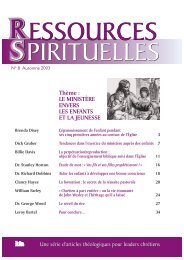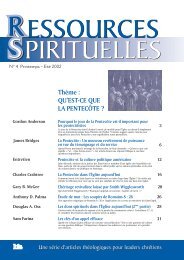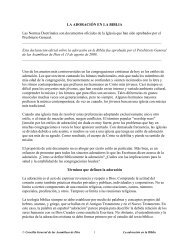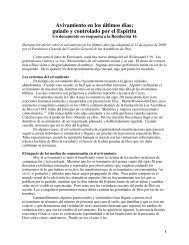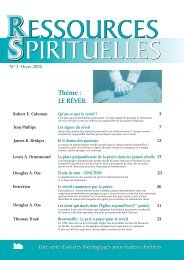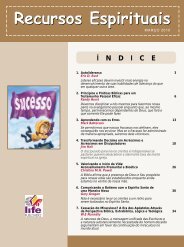WAGF Missions Connection Volume 2 Issue 1 - Assemblies of God ...
WAGF Missions Connection Volume 2 Issue 1 - Assemblies of God ...
WAGF Missions Connection Volume 2 Issue 1 - Assemblies of God ...
Create successful ePaper yourself
Turn your PDF publications into a flip-book with our unique Google optimized e-Paper software.
JAN–MAR 2013 <strong>Volume</strong> 2, <strong>Issue</strong> 1<br />
World World <strong>Missions</strong> <strong>Missions</strong> <strong>Missions</strong> <strong>Connection</strong><br />
<strong>Connection</strong><br />
<strong>Missions</strong> Commission<br />
World <strong>Assemblies</strong> <strong>of</strong> <strong>God</strong> Fellowship<br />
The Acts One One-Eight One Eight Project<br />
Brazil | Interview With Julio Machado<br />
President, Brazilian <strong>Missions</strong> Agency, SEMIPA<br />
Editor’s Note: The <strong>Assemblies</strong> <strong>of</strong> <strong>God</strong> <strong>of</strong> Brazil is unique in that it<br />
doesn’t have a naonal missions sending agency/structure, but<br />
rather a “secretary <strong>of</strong> missions” who networks the many provincial, ministerial,<br />
and local church sending structures. However, Brazil does have missions agencies,<br />
and one <strong>of</strong> them is directed by an <strong>Assemblies</strong> <strong>of</strong> <strong>God</strong> pastor, Julio Cezar Teixeira<br />
Machado. This agency, though it funcons out <strong>of</strong> an <strong>Assemblies</strong> <strong>of</strong> <strong>God</strong> church, is<br />
interdenominaonal. I (Brad Walz) was one speaker at their annual event recently<br />
and was inspired to see what can be done in a small town, through a small church<br />
(by Brazilian standards) to impact the world. The following is an interview with<br />
Julio Machado.<br />
Tell us about celebrang 20 years <strong>of</strong> your missions agency, SEMIPA.<br />
It is very special. When the ministry began as a missions department <strong>of</strong> the<br />
<strong>Assemblies</strong> <strong>of</strong> <strong>God</strong>, we could not imagine nor ask what was happening. We just<br />
wanted to obey the call <strong>of</strong> Jesus. That’s why we love to see what <strong>God</strong> can do<br />
through ordinary people who are willing to accomplish the will <strong>of</strong> <strong>God</strong>. Today we<br />
are excited to have 40 missionary families, totaling more than 200 people, in<br />
spiritually needy regions <strong>of</strong> Brazil, Paraguay, Spain, Italy, and India. Other families<br />
are preparing for Peru, Albania, and Mozambique.<br />
I was amazed at how much the missions agency is growing, despite the size <strong>of</strong><br />
your church and city. Tell us a lile about that.<br />
São José do Vale do Rio Preto has a populaon <strong>of</strong> just over 20,000 inhabitants<br />
and a rural economy in the state <strong>of</strong> Rio de Janeiro. The mother church has 77<br />
years <strong>of</strong> work, 21 years <strong>of</strong> emancipaon, and 1000 members and congregants and<br />
over 17 daughter congregaons in the slums <strong>of</strong> the city.<br />
In this <strong>Issue</strong><br />
Brazil Korea U.S.A. Argenna<br />
CHAIRMAN<br />
Brad Walz<br />
LEAD TEAM<br />
Arto Hämäläinen<br />
Michael Dissanayeke<br />
Alan Johnson<br />
COMMISSION<br />
Lazarus Chakwera<br />
Enson Lweysa<br />
Sco Hanson<br />
Ron Maddux<br />
Titus Poon<br />
A.R. Hashmat<br />
Ed Nye<br />
Mark Renfroe<br />
Dikran Salbashian<br />
Connie Huffer<br />
Norm Edwards<br />
David Mohan<br />
Mike Waldner<br />
Michael Dissanayeke<br />
Hariagus Rimba<br />
Russ Turney<br />
Rey Calusay<br />
Bill Snider<br />
Joseph Suico<br />
Murray Cornelius<br />
Lisandro Bojorquez<br />
Daniel Pelozo<br />
Anisio Nascimiento<br />
Samuel Rodriguez<br />
Jim Sabella<br />
Peter Kuzmic<br />
Arto Hämäläinen<br />
Gheorge Risan<br />
Alun Davies<br />
Pita Cili<br />
Alan Johnson<br />
Mark Hausfeld<br />
Delonn Rance
Brazil | Interview With Julio Machado (connued)<br />
<strong>Missions</strong> Chair and <strong>Missions</strong> Director<br />
Our missions agency was born in 1992, and in 2000 it became known as<br />
“Missionary Planters With a Passion for Souls”—SEMIPA. We have<br />
added hundreds <strong>of</strong> supporng churches for the training, adopon,<br />
sending, and sustaining <strong>of</strong> missionaries. The board is composed <strong>of</strong><br />
people from various denominaons and regions and volunteers who<br />
minister in preaching, lectures, seminars, and workshops. We have a<br />
theological course and other training with various groups in Portuguese<br />
and Spanish. The missionary candidates are trained in loaned facilies,<br />
and we are praying for a missionary training center and refuge, which<br />
by faith has already been named “Barn to the Naons.”<br />
Tell us some secrets <strong>of</strong> how your missions agency grew.<br />
We recognize our geographical, academic, and financial limitaons, but<br />
we never forget the enabling and supplying power <strong>of</strong> <strong>God</strong>. We search<br />
for willing and available team members, and we strive to make the<br />
term “passion for souls” not just an expression, but a real feeling in<br />
each <strong>of</strong> our hearts. With all that focus, we want to send or adopt only<br />
those who are really idenfied and commied to the pr<strong>of</strong>ile<br />
established by Jesus to preach the gospel and make disciples. We were<br />
also blessed to find people and churches commied to the expansion<br />
<strong>of</strong> the Kingdom; in these 20 years <strong>God</strong> has always provided the<br />
resources to sustain the missionaries without delays.<br />
What is your vision for the future?<br />
Our goal is for the physical, financial, and human structures to reach at<br />
least 20 countries through 100 missionary families.<br />
Brad Walz translated by Marcelo<br />
Marns at the convenon.<br />
The simple <strong>of</strong>fices <strong>of</strong> Semipa, where<br />
five work full-me. From here more<br />
than 80 missionaries are sent to 20<br />
countries.<br />
I believe Brazil is a “sleeping giant” and could have a big impact on<br />
the world. I look forward to the day when Brazil is known for its great mission, not its great football<br />
players. What is your desire, as a Brazilian, for the Brazilian church?<br />
My desire is that <strong>God</strong> promotes a great missionary revival among evangelical churches which have grown in<br />
number and financial resources, and that He uses each <strong>of</strong> the boards and missions agencies to challenge,<br />
train, and send many Brazilians to truly needy areas.<br />
A night view <strong>of</strong> the acvity <strong>of</strong> the 3000 who aended the missions convenon at Municipal Government Campground.
Events Calendar<br />
Africa Alliance Meeng<br />
Kenya<br />
February 24–March 2, 2013<br />
<strong>WAGF</strong> World <strong>Missions</strong> Congress<br />
Cancun, Mexico<br />
June 4–7, 2013<br />
World Pentecostal Fellowship Congress<br />
Kuala Lumpur, Malaysia<br />
August 27–30, 2013<br />
Pentecostal European <strong>Missions</strong> Consultaon<br />
Bucharest, Romania<br />
November 13–16, 2013<br />
Southern Asia <strong>Missions</strong> Consultaon<br />
Locaon TBA<br />
2014 date to be determined<br />
<strong>WAGF</strong> World Congress<br />
Springfield, Missouri, U.S.A.<br />
August 7–10, 2014<br />
PAM <strong>Missions</strong> Consultaon<br />
<strong>WAGF</strong> World <strong>Missions</strong> Congress<br />
Bangkok, Thailand<br />
February 2–6, 2015<br />
San Jose 2015<br />
A Consultaon on the Naonal Church and<br />
Unreached Peoples<br />
San Jose, Costa Rica<br />
April 13–17, 2015<br />
Next <strong>Issue</strong><br />
Numerous articles and interviews<br />
from Africa will be included<br />
following the Africa Alliance<br />
Meeting February 24–March 2. The<br />
focus <strong>of</strong> this continental networking<br />
event is world missions! We will<br />
also feature an interview with the<br />
Italian <strong>Assemblies</strong> <strong>of</strong> <strong>God</strong>.<br />
Check out the <strong>WAGF</strong> <strong>Missions</strong> tab and the <strong>WAGF</strong> Web page:<br />
hp://worldagfellowship.org/ and hp://worldagfellowship.org/missions/
Korea | Introducon<br />
“Unless a kernel <strong>of</strong> wheat falls to the ground and dies, it remains only a single seed. But if it<br />
dies, it produces MANY seeds” (John 12:24, NIV, emphasis added).<br />
Some <strong>of</strong> the 145 graves in Yanghwajin<br />
Foreign Missionary Cemetary, Seoul<br />
Museum plaques with 145 names<br />
Reminder <strong>of</strong> John 12:24<br />
Religion in South Korea<br />
Chrisan: 26.3%<br />
(Protestant 19.7%, Catholic 6.6%)<br />
Buddhist: 23.2%<br />
Other/Unknown: 1.3%<br />
None: 49.3%<br />
The transformaon <strong>of</strong> South Korea from a Buddhist naon to having a<br />
strong, visible Chrisan church is no doubt the greatest modern-day<br />
missions miracle. It was a moving experience to visit the Yanghwajin<br />
Foreign Missionary Cemetery in downtown Seoul and see the graves<br />
<strong>of</strong> 145 foreign workers and children who are laid to rest there, as well<br />
as the impressive museum <strong>of</strong> Chrisanity’s origins in Korea.<br />
In the museum is a tribute to John 12:24: “Very truly I tell you, unless<br />
a kernel <strong>of</strong> wheat falls to the ground and dies, it remains only a single<br />
seed. But if it dies, it produces many seeds.”<br />
Truly, we oen forget <strong>of</strong> the sacrifice <strong>of</strong> the early missionaries, who<br />
didn't travel in airplanes, but by boat; who didn't have Internet, much<br />
less telephones; whose good-byes carried greater impact and<br />
meaning. They lived a life <strong>of</strong> sacrifice and suffering for their call. They<br />
had the commitment necessary to obey that call.<br />
Today, everywhere you look in South Korea at night, red crosses dot<br />
the horizon. Most churches have a tower and a lighted red cross that<br />
extends high into the air. What a transformaon! But just as impacng<br />
is the foundaon <strong>of</strong> that transformaon.<br />
Editor's Note: I visited South Korea from November 28 through<br />
December 5 and parcipated in an interdenominaonal conference<br />
called “Ethne 2012.” Taking advantage <strong>of</strong> the trip, I visited two <strong>of</strong> the<br />
three <strong>Assemblies</strong> <strong>of</strong> <strong>God</strong> denominaonal missions leaders as well as<br />
the missions leaders <strong>of</strong> the two largest churches, Yoido Full Gospel<br />
Church and Grace and Truth Church.<br />
South Korea sends out about 25,000 missionaries, second only to the<br />
United States in sending workers to other countries. Though many<br />
have been expats (Koreans working among Koreans in other<br />
countries), the goals for the next generaon are for many young<br />
people to work among unreached people groups and to have sent<br />
100,000 missionaries by 2030. May <strong>God</strong> help them do it.<br />
One interview was with Yoido Full Gospel’s pastor, Young Hoon Lee.<br />
Yoido has historically been the world’s largest church. Pastor Lee<br />
followed Pastor David Yonggi Cho, who at 77 connues to preach the<br />
Sunday 1 p.m. service, one <strong>of</strong> seven services held each Sunday.<br />
Following on the next two pages is that interview.
Korea | Interview With Dr. Young Hoon Lee<br />
General Superintendent, AG <strong>of</strong> Korea Yoido General Council<br />
Obviously, your church [Yoido Full Gospel Church] is famous<br />
throughout the world. Could you tell us a lile about yourself?<br />
I was born in a fourth-generaon Chrisan family. My grandfather<br />
was evangelized by a missionary and started going to church in<br />
Pyongyang before Korea was divided between south and north. My<br />
family was Presbyterian, and they thoroughly educated me in the<br />
Bible. In 1964 my family began aending Yoido Full Gospel Church<br />
(then Full Gospel Central Church), and I was bapzed in the Holy<br />
Spirit, which ignited a fervent faith in me. I was called to ministry<br />
and ordained in 1982. My past ministry posions here at Yoido Full<br />
Gospel Church and its affiliated churches are as follows: director <strong>of</strong><br />
Internaonal Theological Instute; vice senior pastor <strong>of</strong> Yoido Full<br />
Gospel Church; and senior pastor <strong>of</strong> Washington Full Gospel Church,<br />
L.A. Full Gospel Church, and Tokyo Full Gospel Church. In 2008 I was<br />
elected the second senior pastor <strong>of</strong> Yoido Full Gospel Church,<br />
succeeding Pastor Yonggi Cho.<br />
Dr. Young Hoon Lee, Brad Walz,<br />
and Joshua Ahn (missions director<br />
for Yoido Full Gospel Church)<br />
Your church has had a great emphasis on prayer. Could you comment on that?<br />
Yoido Full Gospel Church has a spirituality <strong>of</strong> Spirit-filled, fervent prayer. Since its beginning Yoido Full Gospel Church<br />
has consistently emphasized the importance <strong>of</strong> prayer. Members <strong>of</strong> Yoido Full Gospel Church are experiencing <strong>God</strong>’s<br />
answer to their prayers through unison prayer (in which all saints are praying loudly) in worship services and cell<br />
meengs. Other forms <strong>of</strong> prayer conspicuous in my church are individual prayer, fasng prayer, and speaking in<br />
tongues. Yoido Full Gospel Church founded its world-famous Osanri Choi Ja-sil Memorial Fasng Prayer Mountain.<br />
Every year several hundred thousand Chrisans visit the prayer mountain to pray and experience <strong>God</strong>’s miracles. I<br />
myself go to the prayer mountain every Saturday and pray for more than two hours to prepare for Sunday worship<br />
services. I stress that all Chrisans, through their prayer life, should be filled with the Holy Spirit to become powerful<br />
evangelists and bear abundant fruit <strong>of</strong> the Holy Spirit to live as “lile Jesuses” in their everyday lives.<br />
Korea has given great hope to many people about their potenal for missions sending. We heard about the<br />
stadium event a few years back when many young people dedicated their lives to a missions call. What is your<br />
perspecve on that from a pastoral point <strong>of</strong> view?<br />
<strong>Missions</strong> is the Great Commission <strong>of</strong> Jesus. It is very important for the future <strong>of</strong> Chrisanity and the Church to<br />
movate young people to dedicate their lives to missions. My church, as well as other Korean churches, frequently<br />
hold mass crusades to teach young people about missions, arrange meengs with missionaries, and show them how<br />
they can dedicate their lives to the mission fields. In parcular, my church invented a program called Full Gospel<br />
Mission Training Course to <strong>of</strong>fer praccal training for missions to laypeople. The Department <strong>of</strong> College Students and<br />
Young Adults in my church annually runs a short-term overseas missions program (World Mission) and a domesc<br />
missions program (Revival Korea) to give young people opportunies to dedicate their lives to missions.<br />
Pastor Joshua has a great reputaon as a cross-cultural missionary. It is fantasc that you have brought him back<br />
as your missions director. Please comment on the reasons you did that.<br />
Pastor Joshua (Tae-Kyung Ahn) has performed missions ministry for 20 years in Kenya. He parcularly dedicated<br />
himself to build a missionary center in Kenya last March. Pastor Joshua showed outstanding competency to build<br />
local youth leadership in his ministry. I appointed him as the director <strong>of</strong> the department because his missionary<br />
experience will contribute significantly to the missionary strategy <strong>of</strong> my church, which intends to evangelize local<br />
people by raising local leadership. At the same me, his outstanding leadership and humility were deemed<br />
appropriate to the dues <strong>of</strong> director; that is, to support hundreds <strong>of</strong> missionaries from my church and the churches
that were established by our missionaries, to develop a new mission field, and to send out missionaries.<br />
How many missionaries are being sent by your church and by Korean churches overall?<br />
Currently 694 missionaries from Yoido Full Gospel Church are working in the mission field in 62 countries. Overall,<br />
Korean churches sent 23,331 missionaries to 169 countries as <strong>of</strong> the end <strong>of</strong> 2011. This number includes the number<br />
<strong>of</strong> missionaries sent by various denominaons as well as by missionary organizaons. My denominaon sent 1359<br />
missionaries by the end <strong>of</strong> 2011, which is the second largest number <strong>of</strong> all denominaons in Korea.<br />
Please tell about your vision for the future <strong>of</strong> your church as a pastor and leader in Korea.<br />
Yoido Full Gospel Church could become the world’s largest church because it connues to emphasize the Word <strong>of</strong><br />
<strong>God</strong> and the fullness <strong>of</strong> the Holy Spirit, which is the Pentecostal movement. My church enjoys a tradional heritage<br />
<strong>of</strong> the Holy Spirit movement based on the Word <strong>of</strong> <strong>God</strong> and will develop it in the future. We will serve Korea and the<br />
world to be in the forefront <strong>of</strong> missions work and relief as the church was in the Book <strong>of</strong> Acts, to be interested not<br />
only in personal salvaon but also social salvaon, to nurture “lile Jesuses” who have the power <strong>of</strong> the Holy Spirit<br />
and bear the fruits <strong>of</strong> the Holy Spirit.<br />
What is your vision for the church in the area <strong>of</strong> world missions?<br />
Twenty-first century missions should be done with humility. Western missionaries have been cricized as the<br />
“overpowering mission” or having so-called “mission-imperialism,” despite other wonderful achievements. From now<br />
on we need to pracce humility and servant missions in order to follow the servant leadership Jesus pracced. Yoido<br />
Full Gospel Church will devote all its strength to aboriginal missions and overseas Korean missions, which is<br />
underway. My church has already been running an aboriginal-focused missions policy since 1993 in an aempt to<br />
enhance future ministry. We aim to build a seminary to nurture many local disciples and allow the gospel to be<br />
spread.<br />
How do you think Koreans can impact unreached people groups?<br />
As <strong>of</strong> today, Korea has become the second-leading country for sending missionaries to the world. Up unl the end <strong>of</strong><br />
the nineteenth century, Korea had been a missionary-receiving country. Korean churches have had tremendous<br />
growth despite their short history, and now it is a missionary-sending country. This good example could revive hope<br />
for missions in other naons. In addion, Korean economic development could be aracve in the mission field. We<br />
acknowledge the strengths and weaknesses <strong>of</strong> missions works led by the Western countries over the centuries. We<br />
also understand how people think in missionary receiving countries. Asia has many unevangelized countries.<br />
Characteriscs common among Korean missionaries and other Asians could be a useful factor in successful missions.<br />
What strengths can the Korean missionary bring to the world?<br />
The strengths <strong>of</strong> Korean missionaries are passion for the gospel and strong commitment. Korean missionaries usually<br />
go to the mission field with passion for the gospel only and with the mind-set <strong>of</strong> “I can do it,” even though they are<br />
not well prepared. On the mission field they do their work aggressively with their faith in Jesus. They don’t focus on<br />
circumstances or situaons. I think these strengths <strong>of</strong> Korean missionaries could contribute greatly to bringing groups<br />
<strong>of</strong> unreached people to Christ under the poorest circumstances.<br />
Are there any other comments or things you think would be <strong>of</strong> interest to leadership around the world?<br />
I just want to say that one person’s commitment is very important in the work <strong>of</strong> the Lord. An equipped person with<br />
the gospel and with the power <strong>of</strong> the Holy Spirit can produce much fruit and bring about great works <strong>of</strong> <strong>God</strong>. Even in<br />
early Korean church history, several missionaries came in and fulfilled<br />
significant works for the kingdom <strong>of</strong> <strong>God</strong>. It is important for many people<br />
to devote themselves to Christ. However, it is more important for one<br />
person to commit to Christ thoroughly. We are living at a me when the<br />
Lord will soon return. As “lile Jesuses,” every one <strong>of</strong> us should carry out<br />
our given mission in our daily lives.<br />
Brad Walz with Joshua Ahn in the <strong>Missions</strong> Department
Korea | A Vision for 100,000 Missionaries<br />
There are three different Korean <strong>Assemblies</strong> <strong>of</strong> <strong>God</strong><br />
denominaons that represent over 2 million believers in<br />
over 3000 churches. They are the third-largest movement<br />
aer the Presbyterian and Methodist churches.<br />
One <strong>of</strong> the three denominaons is The General Council <strong>of</strong><br />
the Korea <strong>Assemblies</strong> <strong>of</strong> <strong>God</strong>, represenng 1910 churches.<br />
Superintendent Yong Mok Cho, younger brother <strong>of</strong> David<br />
Yonggi Cho, also pastors Grace and Truth Church. Jin Gi<br />
Bae serves as general superintendent <strong>of</strong> praccal business<br />
affairs and as missions director.<br />
Grace and Truth Church features a ministry <strong>of</strong> 38 satellite<br />
churches or “sanctuaries,” represenng 350,000 members.<br />
Pastor Cho preaches usually from one <strong>of</strong> three locaons,<br />
and each service is broadcast live via satellite to the other<br />
37 locaons. A monitor on the plaorm shows images<br />
from each sanctuary. Though many churches in the United<br />
States have this sort <strong>of</strong> ministry today, Grace and Truth<br />
began it in the early 1990s.<br />
Between the three <strong>Assemblies</strong> <strong>of</strong> <strong>God</strong> denominaons and<br />
networks, over 2000 missionaries are being sent to more<br />
than 65 countries. Many are expats, ministering to Koreans<br />
in other countries through Korean churches. Stascs on<br />
those ministering cross-culturally were not available for all<br />
three groups, but one group has at least 10 percent.<br />
The Korean World <strong>Missions</strong> Associaon (all churches<br />
combined, not just <strong>Assemblies</strong> <strong>of</strong> <strong>God</strong>) has a goal <strong>of</strong><br />
growing from 25,000 to 100,000 missionaries between<br />
now and 2030. Most <strong>of</strong> this growth will be transcultural.<br />
The potenal impact Korea can have on the world is<br />
tremendous. We pray this will happen.<br />
Korea is the second-largest<br />
sender <strong>of</strong> foreign missionaries<br />
after the United States, with<br />
25,000 workers. Their goal for<br />
2030 is 100,000 missionaries.<br />
May <strong>God</strong> use the 73 <strong>WAGF</strong><br />
nations with a sending<br />
structure or missions leader<br />
to sow seeds that will<br />
produce transformation in<br />
many other nations!<br />
Yong Mok Cho and his wife, Brad Walz, and Jin Gi Bae<br />
<strong>Missions</strong> Department, Korean <strong>Assemblies</strong> <strong>of</strong> <strong>God</strong>
United States | Interview with Greg Mundis<br />
Execuve Director, <strong>Assemblies</strong> <strong>of</strong> <strong>God</strong> World <strong>Missions</strong> (U.S.A.)<br />
Congratulaons on being elected execuve director <strong>of</strong> <strong>Assemblies</strong> <strong>of</strong> <strong>God</strong> World <strong>Missions</strong><br />
(U.S.A.) in August 2011. Before this you served as a missionary in Austria and then more<br />
recently as Europe regional director. Tell us a lile bit about your missions call and career.<br />
I was an associate pastor in Springfield, Missouri, when a Filipino superintendent spoke for five<br />
minutes one Sunday morning at church. He had just aended the 1977 World Pentecostal<br />
Conference in Europe, then traveled through Austria and the United States before going home.<br />
But he didn’t speak about the conference or the Philippines, but about Austria. <strong>God</strong> placed a call<br />
on my heart to go to Austria that day (June 12, 1977), the same day my son was born, so it’s<br />
indelibly imprinted in my mind.<br />
We went to Austria the winter <strong>of</strong> 1980 and began a year <strong>of</strong> language study. Aer about 11<br />
months I was preaching in German. During our first term we conducted Global University<br />
seminars throughout Austria, preached in churches, and I was an elder in the Salzburg church.<br />
Greg Mundis<br />
During our second term we translated for the World Pentecostal Conference in Zurich,<br />
Switzerland, and got heavily involved in evangelisc Chrisan TV—a first in Austria, which had a<br />
monopoly on all electronic media. Some Austrian and Italian entrepreneurs opened a TV staon in northern Italy and began<br />
broadcasng into Austria, reaching 1.5 million people, so we got evangelisc programs on that staon. We spent four years<br />
working producing, moderang, direcng, and filming these programs. We c<strong>of</strong>ounded Vienna Chrisan Center, and when we<br />
returned the next term, we began to pastor that church. Simultaneously, the Berlin Wall came down and Eastern Europe and the<br />
former Communist Bloc were opening up.<br />
In 1991 I was appointed area director for Austria, Czechoslovakia, Hungary, and Poland. I had the privilege <strong>of</strong> pung our first<br />
full-me resident missionaries in those countries and also connuing the television ministry. The church grew, we were able to<br />
get another pastor, and I connued as area director.<br />
In 1998 I was elected regional director for all <strong>of</strong> Europe, which contains Greenland and the Nordic countries down to Greece and<br />
everything in between. I served in that posion 13 years.<br />
Before the 2007 World <strong>Missions</strong> Congress in Buenos Aires, naonal leadership in Europe suggested you as a speaker, saying,<br />
“Greg is European; he’s one <strong>of</strong> us.” That is a big compliment for a missionary. What are some keys to a missionary gaining that<br />
respect with naonal churches and leaders?<br />
It was very kind <strong>of</strong> my colleagues to say that. Different elements from my missionary life in Europe and Austria contributed to<br />
that. First, language acquision was extremely important. Everybody knows you can get along in English in Europe, but fluency in<br />
German was a big deal. German is one <strong>of</strong> Europe’s major languages (with almost 100 million German speakers), and no maer<br />
where in Eastern or Western Europe, we could converse in German. Second, Sandie and I integrated into the Austrian<br />
Pentecostal Church, which provided credibility and acceptance <strong>of</strong> our ministry and helped us develop a good reputaon among<br />
leadership. I think the third element was longevity coupled with relaonships. We spent almost four full terms in Europe and<br />
enjoyed the people we spent me with. People feel or sense when it’s not just a duty or a requirement but a joy to be with<br />
them.<br />
You’ve been in the Execuve Office over a year now and have traveled a lot to other regions and areas. What are some<br />
highlights and impressions?<br />
The visit to Thailand, Cambodia, and Vietnam was eye-opening for me. The incredible contrast in culture, language, and context<br />
was delighul. Most <strong>of</strong> my ministry experience has been in Catholic, Orthodox, or Muslim environments, but the Southeast Asia<br />
Buddhist worldview is very different and affects society uniquely. Our missionary in Siem Reap, Cambodia, works among floang<br />
villages, planted a floang church, and partnered with an organizaon in the United States to build a floang school (the children<br />
actually come to this Chrisan school in boats and canoes). The influence and dedicaon parents have to their kids’ educaon is<br />
amazing, because an educaon means their kids don’t have to stay in the village. They built a high school on land where kids can<br />
also live; some were graduang and going on to university when I was there.
What is your vision for the future <strong>of</strong> <strong>Assemblies</strong> <strong>of</strong> <strong>God</strong> World <strong>Missions</strong> (U.S.A.)?<br />
First, our founding fathers, in a prophec resoluon at the 1914 General Council in Chicago, Illinois, stated that <strong>God</strong> would raise<br />
up the greatest tool <strong>of</strong> evangelism the world had ever seen. The <strong>Assemblies</strong> <strong>of</strong> <strong>God</strong> and its worldwide partners has grown to 65<br />
million-plus. This historical understanding—that world missions is our identy—should be ingrained in every minister and church<br />
in the <strong>Assemblies</strong> <strong>of</strong> <strong>God</strong>. We would like to see the U.S. church connue the incredible service they have performed throughout<br />
these 99 years <strong>of</strong> sending missionaries and partnering with churches around the world. The U.S. <strong>Assemblies</strong> <strong>of</strong> <strong>God</strong> now has<br />
personnel in or relaonships with 190 countries in the world. If you count provinces and territories, we are in 252. So the passion<br />
for the U.S. church is to connue to fan that flame <strong>of</strong> missions history while igning it for the future with vision casng.<br />
The vision is not new. It’s grounded and rooted in the 1921 General Council minutes, where our forefathers talked about<br />
following the Pauline example <strong>of</strong> missionary work; in other words, the three “self” principles—self-governing, self-propagang,<br />
and self-financing—which altogether we call the indigenous principle. More than that, the forefathers stated we would seek out<br />
neglected regions. In today´s words that means unreached peoples. The 13 members <strong>of</strong> our AGWM Execuve Commiee have<br />
commied to going to these neglected regions, these unreached peoples. That’s our first vision and focus for the future.<br />
Second, we have commied to advocate for the suffering church. We have a growing realizaon that many <strong>of</strong> our brothers and<br />
sisters in Christ around the world do not have the freedoms we enjoy in North America. Consequently, many suffer or are<br />
persecuted for the name <strong>of</strong> Jesus. Some figures state 2000–3000 martyrs per year. We have seen this as we pray for people<br />
jailed in Iran. We hear about suffering in Nigeria and different places <strong>of</strong> the world. We would like our church to be more aware.<br />
We must never discount the idea that we can pray for our brothers and sisters in Christ who are suffering for sharing the gospel,<br />
but we can also pray for their families. We can even write to governments. Our general superintendent, Dr. George Wood, has<br />
advocated for several people, bringing the leverage <strong>of</strong> his <strong>of</strong>fice (he is also chairman <strong>of</strong> the World <strong>Assemblies</strong> <strong>of</strong> <strong>God</strong> Fellowship<br />
<strong>of</strong> 65 million believers) to bear on behalf <strong>of</strong> the suffering church.<br />
The third area would be to leverage our partnerships to bring in the harvest. At this moment the U.S. <strong>Assemblies</strong> <strong>of</strong> <strong>God</strong> sends<br />
out 2700 plus missionaries. The World <strong>Assemblies</strong> <strong>of</strong> <strong>God</strong> Fellowship sends out 4818 missionaries. So together, obviously, we<br />
have a very significant missionary force. Yet there is sll so much more to do, because there are over 7000 unreached people<br />
groups. We hope to grasp the idea that we can do more together than we can separately. Also, we want to follow the leading <strong>of</strong><br />
the Spirit and work together to place our personnel strategically and in teams (or at least in consonance) to complete the task<br />
Christ has given us, to preach the gospel to all the world.<br />
You’ve been supporve in encouraging missions efforts from other countries and have also parcipated with Arto Hämäläinen<br />
and the Pentecostal World Fellowship missions commission. What are your thoughts about this, and do you have a challenge<br />
for leaders around the world?<br />
I would say again that we need to grasp the fact that we can do more together than we can singularly. We can learn the lessons<br />
<strong>of</strong> cooperaon, consultaon, seeking advice, giving advice, and communicang openly and honestly—leveraging the knowledge<br />
we all bring to the table and finding projects that fit each <strong>of</strong> our missions. Then we won’t be outside the parameters <strong>of</strong> who we<br />
are (our identy), but will find equal partners, senior partners, or junior partners in parcular missionary enterprises.<br />
In the areas <strong>of</strong> partnership and unreached peoples, we can really do more. I know the Pentecostal European Fellowship made<br />
goals to the year 2020 or so for reaching 200 unreached people groups. It would probably behoove all <strong>of</strong> us to ask, Who are<br />
other missions groups trying to reach, and who are we working to reach—is there overlap? Can we help each other? If there’s<br />
not overlap, good; we won’t duplicate our efforts. But if we are reaching to the same group, can we create a team, or at least a<br />
strategy, in regard to our roles?<br />
Would you like to share any other thoughts or comments?<br />
I just want to say that I believe <strong>God</strong> has posioned the Pentecostal church in a unique point in human history to be able to do<br />
more than we have ever done in missions. Famous conferences happened in the nineteenth and tweneth centuries about<br />
reaching the world with the gospel. Look at what <strong>God</strong> has done since 1900 and the outpouring <strong>of</strong> the Spirit. It is esmated<br />
(Patrick Johnstone and the Foreign Affairs magazine both agree) that there are between 450 and 700 million Pentecostals/<br />
charismacs in the world. You have to say that with that kind <strong>of</strong> outpouring <strong>of</strong> the Spirit, <strong>God</strong> has a wonderful plan in moon.<br />
Scripture tells us in Joel and Acts that in the last days <strong>God</strong> will pour out His Spirit upon all flesh, which He is doing.<br />
In addion to that are today’s demographics: 32 percent <strong>of</strong> the world’s populaon lived north <strong>of</strong> the equator in the 1900s, but by<br />
the year 2050, if present trends connue, less than 10 percent will be there. Given what is happening in Africa, Lan America,<br />
and anywhere below the equator, you have to say that <strong>God</strong> is posioning the church in the Southern Hemisphere to pick up the<br />
mantle <strong>of</strong> preaching the gospel, sending out missionaries, building the church, and formulang theology and missiology. So we<br />
want to be good partners in that and be a part <strong>of</strong> what <strong>God</strong> wants to do in these last days.
ARGENTINA | Future Missionary Group Sets Pace<br />
Tony Pedrozo, Argenna AG Naonal <strong>Missions</strong> Department<br />
Editor’s Note: Sensing a need to bridge the disconnect between future missionary<br />
candidates and the <strong>Missions</strong> Department, in 2004 I asked Daniel Pelozo, currently an<br />
Argenne missionary to Costa Rica and at that me one <strong>of</strong> their staff members, to<br />
develop a program called “Potenal Missionary Group.” The program helps prepare the<br />
next generaon <strong>of</strong> missionaries. Its current director, Tony Pedrozo, has been leading<br />
the program since 2007. Tony was a missionary in Congo and Chad for over ten years<br />
before returning to Argenna to serve in the Naonal <strong>Missions</strong> Department. Since its<br />
start in 2004, at least five other countries have begun similar programs in Lan America.<br />
Please talk about Potenal Missionary Group (PMG). What is its purpose?<br />
PMG rises as an extended arm from our Naonal <strong>Missions</strong> Department to the local Tony Pedrozo<br />
church and its pastor to enhance the vision <strong>of</strong> the people being called to missions and<br />
to provide training before they are approved as candidates. PMG members have a<br />
burden or missionary calling but do not have an immediate missions project. The main purpose is to equip them for<br />
two to ten years before being appointed as an <strong>of</strong>ficial candidate.<br />
PMG provides an environment where applicants can meet others who share the same interests, parcipate in special<br />
retreats that nurture and inspire their calling, and be trained formally and informally. During the period <strong>of</strong> waing<br />
and training, we <strong>of</strong>fer mentoring, theological and missions training, language studies (especially English or another<br />
language, if they know where they are going), and a secular diploma as part <strong>of</strong> the strategy to jusfy their service in<br />
restricted countries where it is not possible to get religious visas.<br />
One requirement is that husband and wife enter the PMG walking in the same direcon and under the same vision.<br />
For single members, we pray with them and give them some tools to help them choose the right person to marry,<br />
which helps to avoid complicaons before going to the field. Over the years approximately 30 members have goen<br />
married, and some are already on the mission field.<br />
Describe the annual retreats.<br />
PMG provides a retreat in Buenos Aires once a year—all members are required to parcipate. Most candidates live in<br />
the surrounding areas, because some are studying at our Bible school or a local university, but 40 percent come from<br />
far provinces. All invest their own resources each year to receive appropriate training given by veteran missionaries<br />
and naonal missions leaders. The retreat is a smaller and shorter “School <strong>of</strong> <strong>Missions</strong>.” We also provide teachers<br />
and caregivers for their children, using that me to prepare them for future overseas ministry. Workshop speakers<br />
talk about their missions experience with an open heart, more from a praccal point <strong>of</strong> view, and give the<br />
parcipants a chance to express their concerns, doubts, wrong expectaons, and so on. The program is not always<br />
the same; PMG members will vary subjects and strategies. They may watch a movie and analyze the context, people,<br />
and main theme to get personal lessons for their situaons.<br />
It’s also a me to get to know people from other retreats, somemes making friendships that will help them<br />
overseas. For example, two families with the same last name and called to the same country have been developing a<br />
close friendship, praying for and encouraging each other regarding the calling <strong>God</strong> has given to them. And as we<br />
menoned above, it’s also a me to meet a future wife or husband.<br />
We have one or two worship services for prayer and consecraon <strong>of</strong> new PMG members. We pray especially for<br />
those who are geng married soon and for those who are going to present their candidature to the Naonal<br />
<strong>Missions</strong> Department before the next retreat.
What results have you had from this ministry with new candidates?<br />
I can summarize the results <strong>of</strong> the PMG ministry as follows:<br />
⇒ Persevering in communicaon with members, especially by e-mail and phone.<br />
⇒ Vising members in their local churches, talking to their pastors, and observing them in their local environment.<br />
⇒ Publishing a monthly bullen to share news, a short devoon, tesmonies, and prayer requests. We welcome new<br />
members and encourage established ones to help those from the same city/region, such as involving them in<br />
special events.<br />
⇒ Following up with those who are struggling and advising those who feel it’s me to formalize their calling. Good<br />
communicaon with local pastors is maintained.<br />
⇒ Requiring parcipaon at the annual retreat.<br />
⇒ Offering a possible exploratory trip to the mission field, especially where Lan American missionaries can share<br />
tools and learn more about the field before stepping foot on it as an <strong>of</strong>ficial missionary.<br />
⇒ Having an updated database <strong>of</strong> all members to keep in touch with from our <strong>of</strong>fice and encouraging them to do the<br />
same with us.<br />
⇒ Enhancing the maturity <strong>of</strong> the new missionary candidates, because they can beer prepare their sending structure<br />
and verify if the pastor and leaders can support with their vision and work.<br />
Do you have any suggesons for other countries regarding starng something similar?<br />
It’s very important to promote missions in all <strong>of</strong> the churches, spending me with the pastors and conducng a survey<br />
to find church members who are feeling something from the Lord about missions. For that reason, it’s necessary to<br />
have at least one key person (director or moderator) and a part-me secretary for PMG work. It takes a lot <strong>of</strong> me to<br />
inerate within the country, to interact and meet the interested people, prepare retreats, and so on.<br />
It’s amazing how <strong>God</strong> has blessed us in the last few years, seeing the maturity <strong>of</strong> the members. Local churches and<br />
pastors become interested through them. The new generaon <strong>of</strong> missionaries on the field today is the result <strong>of</strong><br />
invesng many resources, sharing experiences, and spending me with them even before they apply for missions work.<br />
The annual retreat in August 2012 was attended by 157 <strong>of</strong> the 191 Potential<br />
Missionary Group members. With Argentina currently sending out 160 missionaries,<br />
that number could potentially double within ten years.
Did you know...<br />
• 73 countries associated with the World <strong>Assemblies</strong> <strong>of</strong> <strong>God</strong> Fellowship<br />
have a missions department or coordinator <strong>of</strong> some kind? (Our goal is<br />
100!)<br />
Pre-Congress World <strong>Missions</strong> Leaders Forum<br />
June 3–4, 2013 ♦ Cancun, Mexico<br />
Open to missions leaders and superintendents <strong>of</strong> all countries in attendance.<br />
Monday, June 3<br />
5 p.m.<br />
Presentations and Results <strong>of</strong> Census<br />
6–8 p.m. Forum 1<br />
A. The Characteristics <strong>of</strong> a Mature<br />
<strong>Missions</strong>-Sending Agency (Brad Walz)<br />
B. Researching the “Critical Mass” <strong>of</strong><br />
at Least 40 Sent Workers (Gheorghe<br />
Ritisan)<br />
Questions and Round-Table Response<br />
• If every believer in the <strong>WAGF</strong> network gave just $1.28 per month, we<br />
would have over $1 billion in missions giving?<br />
Tuesday, June 4<br />
9–11 a.m. Forum 2<br />
A. Ethics in the Sending <strong>of</strong><br />
Missionaries (DeLonn Rance)<br />
B. The Importance <strong>of</strong> Using and<br />
Working With Networks (Arto<br />
Hämäläinen)<br />
Questions and Round-Table Response<br />
11–11:30 a.m.<br />
Basic Values <strong>of</strong> the <strong>Assemblies</strong> <strong>of</strong> <strong>God</strong><br />
that Propel <strong>Missions</strong> (Greg Mundis)<br />
11:30 a.m.–12 noon<br />
Prayer and Intercession for AG<br />
<strong>Missions</strong><br />
• The <strong>WAGF</strong> has the potenal to have missions-sending structures in over<br />
100 countries, engage 10 million intercessors, and send over 100,000<br />
missionaries?


